 Saying this column was on a hiatus would be a slight understatement, I think. Nevertheless, it’s back. With this edition, I wanted to try out a new format similar to CHUD’s popular Tag Team reviews or the It Said, It Said columns from the days of yore, only with this I wanted to include some of that fun, playful, and sometimes awesomely rude sensibility our message boards are (in)famous for. Non-board users, I hope you’re not scared shitless.
Saying this column was on a hiatus would be a slight understatement, I think. Nevertheless, it’s back. With this edition, I wanted to try out a new format similar to CHUD’s popular Tag Team reviews or the It Said, It Said columns from the days of yore, only with this I wanted to include some of that fun, playful, and sometimes awesomely rude sensibility our message boards are (in)famous for. Non-board users, I hope you’re not scared shitless.
If people enjoy this format enough, I’ll continue it. Individual articles like the ones we’ve run in the past are still always welcome. Just email me your ideas and I’ll sort you out. As for group collaborations/discussions like the one below, simply partner up with folks on the message boards. Private message/email/smoke signal each other, agree on a topic, and then contact me. We’ll do round robin emails. It’s a fun way to include more people in different discussions, and more importantly, have it be less of a chore to write (because I, like many of you, can be lazy as fuck to actually write "assignments"). And remember, topics can be about anything media/entertainment related. So if you guys got something on your mind, let me know!
Anyway, I hope you folks enjoy. If not, tell me and I’ll disappear into the abyss… or just get really mad. Whatever.
That Peter Jackson Sure Is Something… But WHAT Exactly?
By Andrew Clarke, Charlie Brigden, Bill Nolen, Carlton Stevens, Brad Millette, and Shane Yaroch
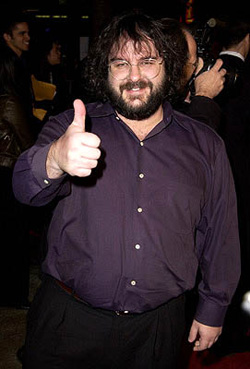 George: Let’s get this started. My original intention was to discuss King Kong and PJ’s whole sorta process behind it. But being that it’s been awhile already since Kong‘s release, I’m not so sure it’s that timely of a film to really get into anymore. But thankfully, Peter Jackson himself can be talked about pretty much any goddamn time.
George: Let’s get this started. My original intention was to discuss King Kong and PJ’s whole sorta process behind it. But being that it’s been awhile already since Kong‘s release, I’m not so sure it’s that timely of a film to really get into anymore. But thankfully, Peter Jackson himself can be talked about pretty much any goddamn time.
Kong wasn’t PJ’s best film overall, yet I felt its parts showed off exactly the elements which make him such a great filmmaker… a filmmaker capabale of the best and biggest spectacle in the biz, but also one with a clear and very strong grasp of intimate human drama. I’ve seen people equate the guy to people like Spielberg, Lucas, even David Lean, De Mille, or as an actual modern day technician like Ray Harryhausen (despite not actually being an animator like he was). Are those comparisons justified at all, do you think? I can certainly see similarities, but what things actually seperate him from a group of filmmakers like that? Is there anything? And if what I wrote above doesn’t make sense, I apologize. It’s like 2:00am over here.
Andrew Clarke: Who goes first?
Carlton Stevens: Not me, too much responsibility. Plus the first person always has to have a joke, and I’m not funny.
Charlie Brigden: The monkey laughed and made her fall down. LOLOLOL.
George: Just remember that I hate you guys, okay?
Bill Nolen: That is the most concise examination of Kong to date, Charlie. Good on you!
Alright, here’s my take: He has an enormous amount of creativity and energy. He worked on three highly technical movies at the same time over a ten year period. During that process, after success for The Lord of the Rings trilogy was assured and after The Return of the King won the biggest awards, he had absolutely nothing to stop him from taking the fantasy crown away from Lucas. King Kong was a logical progression for him, and obviously a project that he had dreamed about for a long time.
The finished product is a mixed bag. The technical aspects are beyond criticism. WETA is the new standard-bearer for digital effects and live-action artistry. Kong is truly alive in the new film. The core elements of Kong‘s story are all in place, updated for a modern audience, and full of emotional power. The writing is more troubling in the first third, as everyone else has noted so far. I’m afraid that PJ has a problem thinking in smaller terms now. Writing a 90-page script seems like it would be a real stretch for him. He lets the technical aspects of the production establish the size of the production. He knows that he has so many powerful toys at his disposal, that when the effect shots are not on the screen he seems a little less focused. I don’t know how I would have cut Kong down to 2 hours, but I’m almost sure that he could have done it in the writing and still emerged at the end with the movie he wanted to make. One way that he differs from Lucas is that he really cares about the story. He goes for spectacle and a good story at the same time.
I would love to see him move away from fantasy for his next couple of projects. The comparison to Spielberg and Lean doesn’t quite work yet. Heavenly Creatures was a great dramatic movie, but he now has the name to make a big dramatic picture that will get immediate attention. I wonder if he will turn the writing over to other people in the future as well.
Okay, I’ll let that stand for a while. Feel free to tear my ideas apart.
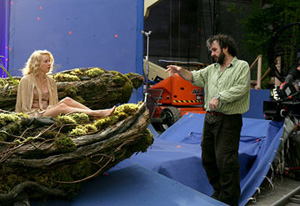 Andrew Clarke: See, I think Peter Jackson is a big fat geek. He’s the backroom FX guy who ended up directing because no-one else around him shared his passion. Also, being from NZ, there was probably no-one around him at all, period. Except sheep, and they don’t make good DPs. Deep down I believe he still thinks like a geek and an FX man, which is to say what he really cares most about are the monsters and the squibs. Spielberg includes gore because he wanted to scare people. Jackson includes scares because he wants to show the gore.
Andrew Clarke: See, I think Peter Jackson is a big fat geek. He’s the backroom FX guy who ended up directing because no-one else around him shared his passion. Also, being from NZ, there was probably no-one around him at all, period. Except sheep, and they don’t make good DPs. Deep down I believe he still thinks like a geek and an FX man, which is to say what he really cares most about are the monsters and the squibs. Spielberg includes gore because he wanted to scare people. Jackson includes scares because he wants to show the gore.
Now the steadying hands Phillipa Boyens and Fran Walsh, not to mention the sturdy backbone of Tolkein’s source material, gave his flying cameras and detailed battles weight and resonance, but Kong may be closer to the true Jackson than LOTR.
Take the scene with the giant freaky catepillar that crawls towards Ann while she’s trapped in a hollow log. That’s the freakiest catepillar in all of movies and i watched it from behind my hands, but in any other film it’s a 2 second jump scare – in Kong it’s about 2 minutes long. It’s great because Jackson cared enough to take the time to make it great, but it’s too long because Jackson only really cares about the creepy crawlies.
It’s those awesome but pointless bits that litter Kong that i feel are the true Jackson. Him being seen as a master storyteller may be more a result of Tolkein and his co-writing team.
Brad Millette: That was a centipede, not a caterpillar, thank you.
Andrew Clarke: I guess Millette is our resident expert on made-up entymology. What colour is the abdomen of the Xanaduvian jumping spider, Brad?
Brad Millette: Chartreuse.
Charlie Brigden: But Andrew, you own Van Helsing.
Bill Nolen: Ohmylordholyjesussaveus.
Carlton Stevens: Andrew and Bill mentioned the thing Jackson has about lengthy endeavors in films, and that really is the only gripe I have with him. I can tolerate the cheesy writing, and I enjoy the idea of a technically proficient director holding his own reins in filmmaking, but what I don’t like is the restating of the obvious, beating us over the head with what we’re watching and should be able to assume ourselves.
Jackson, really, really wants you to know what’s going on. Drenching us in most of the Depression era and trying to give the time an identity was nice. The problem was he littered it thick with atmosphere, as if he was right behind me constantly saying, “We’re in the Depression! Look! There are some Hoovervilles…from the depression!” But that was slight. Real problems came along when he reinforced Ann’s love for Kong and the relationship they had, not only in Kong’s death scene, but when they were on ice. I felt those scenes would never end. They were lovely things at first…but they were starting to get annoyingly long.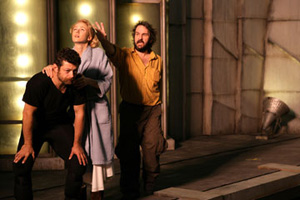 And this is a common practice he had in Lord of the Rings as well. Two Towers had that very drawn out scene of Aragorn going along the river and Arwen lamenting over him. Return of the King had everyone jumping into Frodo’s room in slow motion. They’re all things that go on too long, telling us the same thing over and over. It really isn’t even a matter of taking them out, because those scenes are rather relevant, it’s a matter of just making them a little shorter or better paced.
And this is a common practice he had in Lord of the Rings as well. Two Towers had that very drawn out scene of Aragorn going along the river and Arwen lamenting over him. Return of the King had everyone jumping into Frodo’s room in slow motion. They’re all things that go on too long, telling us the same thing over and over. It really isn’t even a matter of taking them out, because those scenes are rather relevant, it’s a matter of just making them a little shorter or better paced.
With that in mind I really had a lot of fun watching King Kong. Jackson is just a big kid like I am and at least in some ways is honest about that image. Spielberg and Lucas have sort of wrapped themselves in a security blanket of maturity in some of their films so it seems like they’re a little bit more seasoned (save for maybe Munich), but deep down they’re just kids having a lot of fun playing with toys. I think Jackson is more honest about that image, and you get that from his films. It’s something I find admirable and charming in his work.
Andrew Clarke: Don’t make me pull my dirt on you people. Let’s keep this civil.
And for the record, I had to research that film for a previous Chewer Column (read it here), I have given it away as a present, I do think it represents everything that is wrong wth modern blockbuster film-making and it is still more fun to sit through than Attack of The Clones. Fett.
Brad Millette: But you still bought it. With your own money. Real money.
Charlie Brigden: I realize that sitting through rectal surgery is more fun than Attack of the Clones, but it feels like a blowjob from Scarlett Johansson in comparison to Van Helsing.
George: Bill makes a good point about Jackson not quite being there next to Spielberg or Lean. What kind of stuff would he have to make to get there? That is, if "there" is even where he wants to be. And really, despite it being based on a factual story, Heavenly Creatures is still a film that’s pretty deep into fantasy… and if he really does do The Lovely Bones next, he’ll again be within that same realm of genre filmmaking. I mean, I’d love to see him tackle a straight drama because he’s shown to be so damn good at it (and at the same time shows what a good "actor’s director" he can be). But then again, he’s got this visual flair that would seem to be squandered in the confines of a straight drama. I don’t know. I’m pretty hammered right now.
Oh, and Andrew, I always thought that monstrous centipede acted as more of an audience distraction for them to kinda forget about the V-Rex looming outside that log and also to give Darrow a reason to run out there amidst the giant fucking lizards. Also, I think it makes a funny case about how humans, even if say there really was a tree-sized monster looming outside their window, would probably still be scared stupid (if not stupider) by a bug crawling on their hand… granted, the bug would probably have to be the size of a pillow. Or Mark Pillow.
Bill Nolen: I’ll offer Sam Raimi as an example of a "visually-oriented" director who can pull off dramatic subtlety. A Simple Plan, anyone?
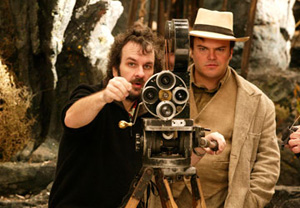 Brad Millette: I think Jackson’s strengths are that he’s good with big visuals, but he’s also good at directing actors. In both The Lord of the Rings trilogy and Kong, under his direction, his casts were able to really sell scenes in which they were essentially interacting with nothing. I think he’d be capable of moving down to a smaller, character oriented film. I’m not sure I’d want him to direct a straight drama, though. I’m not entirely sure I want to see "the next Spielberg", but time will tell.
Brad Millette: I think Jackson’s strengths are that he’s good with big visuals, but he’s also good at directing actors. In both The Lord of the Rings trilogy and Kong, under his direction, his casts were able to really sell scenes in which they were essentially interacting with nothing. I think he’d be capable of moving down to a smaller, character oriented film. I’m not sure I’d want him to direct a straight drama, though. I’m not entirely sure I want to see "the next Spielberg", but time will tell.
Charlie Brigden: I certainly think he’s very good with actors, and casting. Black in Kong was a good, out of left field choice and he gave a fine performance, but obviously you have too look at LOTR, with Mortensen, McKellen, and even Sean freaking Astin.
I don’t necessarily think he cares too much about the creepy-crawlies. I think his biggest love is the story, despite his love of gore and monsters, but I think, without turning this into a Lucas bashfest, unlike George, he perhaps realizes that his strengths aren’t necessarily the best when it comes to writing, which is why he likes collaborating with Walsh, and the lovely Phillipa Boyens.
Andrew Clarke: I guess it depends very much on what you mean by ‘next spielberg’. In terms of impact on the industry or blockbuster film-making, he’s already there. In terms of embracing big cheesy emotional moments and ramming them home, he’s also right in line. Look how long it took Spielberg to make a ‘mature’ film. I don’t think The Lovely Bones, with its ghosts of little girls looking down from heaven, is going to help on the path towards adulthood. Jackson has always been able to get us to side emotionally with his characters, but the characters are usually painted with a fairly broad brush. Perhaps staying with comedy and fantasy will help hide the rather corny side of his work.
And for the record – Fran is much lovelier than Phillipa.
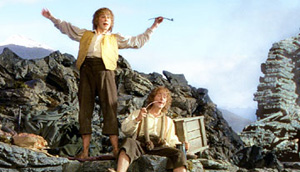 Charlie Brigden: Yeah, but the way you’re explaining that, is saying corny as if it’s this bad thing. It’s a fact that we’ve become so obsessed with being hip and cool that that stuff is immediately being labelled cheesy like it’s this huge horrible thing, where in some movies, you need that kind of emotion. For example, the scene on the bed at the end of The Return of the King. After all that time of following the stories, and seeing the whole Fellowship reunited, it was such a sweet scene that needed that edge to really emphasize what they’d all just been through, especially with the Hobbits, different as they are to everyone else, and yes, child-like.
Charlie Brigden: Yeah, but the way you’re explaining that, is saying corny as if it’s this bad thing. It’s a fact that we’ve become so obsessed with being hip and cool that that stuff is immediately being labelled cheesy like it’s this huge horrible thing, where in some movies, you need that kind of emotion. For example, the scene on the bed at the end of The Return of the King. After all that time of following the stories, and seeing the whole Fellowship reunited, it was such a sweet scene that needed that edge to really emphasize what they’d all just been through, especially with the Hobbits, different as they are to everyone else, and yes, child-like.
And Phillipa – I guess it’s the redhead lover in me. That, and I love chicks with a bit of meat on the bone.
George: Regarding Phillipa, you might change your tune if you watch the last Kong Production Diary, Andrew.
Brad Millette: Now that Naomi Watts is a real piece of work.
Andrew, I meant in terms of Spielberg’s breadth of filmmaking. Love it or hate it, he’s gone beyond big action science fiction spectacle into the realm of straight drama. I’m not sure Jackson really needs to do that, but I am interested to see what he could do with a smaller film. The Lovely Bones sounds intriguing, and I’m looking forward to seeing that, particularly after the almost brain melting spectacle of Lord of the Rings and Kong.
Damn, I used "spectacle" twice there. I should’ve gone with "bombast".
Charlie Brigden: If The Lovely Bones is anything like Heavenly Creatures, I’ll be happy.
Andrew Clarke: Corniness can be exactly the right thing for some movies, movies where heightened, clearer, primary-coloured emotions are needed – like fantasy for example. The question is whether Jackson chose that broadness deliberately for the film, or whether it’s something he’s going to apply to every film he makes, suitable or not. From the rest of his filmography, I’m guessing the latter. And dude, the end of Naomi’s nose is really big. They don’t quite match Kong’s face-vaginas, but i think he was attracted mostly to her nostrils.
And dude, the end of Naomi’s nose is really big. They don’t quite match Kong’s face-vaginas, but i think he was attracted mostly to her nostrils.
Brad Millette: But her nipples… they are glorious.
Charlie Brigden: I dunno, It seems you’re intent on painting the guy as this certain type of filmmaker who is going to do everything he does in every film ad nauseum, which I think is a bit unfair as he’s still in his infancy as a director for me. There were all kinds of little touches in LOTR that really get glossed over because of the more bombastic action stuff, but that’s the kind of thing that comes with that genre, which I think is important to remember.
Then again, it depends on your point of view. I see too many films nowadays that have all this cool dialogue that in no way sounds like anything someone would say in real life, and we like that because it’s cool, and we think ‘Hey, I could be that smart-talking guy or gal.’ The fact is, in real life, people are fucking cheesy, whether we like it or not.
Brad Millette: You stole my bombast, Brigden.
Andrew Clarke: What has LOTR got to do with real life? Real life doesn’t have a three act structure, it doesn’t have a musical score and it doesn’t have sequels if the box office was good. Just because people get tongue tied or overly sentimental in life, doesn’t mean it makes for good cinematic drama. Yes, Jackson cares about story more than most blockbuster makers these days, but those emotion chasing instincts of his can lead him astray – as in the pillow-fight scene. It was mawkish and sentimental, but it was also unnecessary as we’ve already seen the hobbits playful and loving plenty of times. The story really called for showing how the hobbits had changed through their adventures, which we finally get to with the Shire scenes, but not before a really crass ‘everybody’s safe and happy again’ scene not much more subtle than everyone cheering in the control room when the astronauts/soldiers/care bears get back safely. AND it’s in slo-mo.
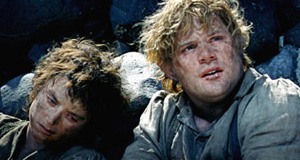 Charlie Brigden: It wasn’t unnecessary at all. Yes, we’ve seen the hobbits being like that before, but after all the darkness we had been through in both TTT and ROTK, it was needed for that big release, like sometimes, the big cheer in the control room is sometimes needed. It’s not crass at all, I just think you don’t like it because of your sensibilities and you’re persecuting the guy for doing something that doesn’t fit in with what you thought you should see. I just think you’re approaching this in the wrong way, and rejecting it because of your inclinations instead of accepting it for what it really is.
Charlie Brigden: It wasn’t unnecessary at all. Yes, we’ve seen the hobbits being like that before, but after all the darkness we had been through in both TTT and ROTK, it was needed for that big release, like sometimes, the big cheer in the control room is sometimes needed. It’s not crass at all, I just think you don’t like it because of your sensibilities and you’re persecuting the guy for doing something that doesn’t fit in with what you thought you should see. I just think you’re approaching this in the wrong way, and rejecting it because of your inclinations instead of accepting it for what it really is.
George: I was crying like a big fat cunt during the "pillow-fight" sequence in question, just so you guys know.
Andrew Clarke: Did anyone else cry during that scene?
Bill Nolen: I was almost crying because I had to piss really bad. Other scenes pulled authentic tears out of my eye sockets, though.
Carlton Stevens: The only scene I cried at in LOTR was Boromir’s death, which, in my opinion, was the best emotional beat Jackson got in all the films. The very quiet, contemplative scene in the Shire where they’re all sharing an ale is another one that’s just about perfect.
I love emotional moments when they have just the right amount of resonance, and I don’t often get teary eyed with them because most of the time filmmakers (or at least genre ones) go for the extremes. Either its dead pan and near cold (Matrix) or it’s so overtly over played it looses it appeal, which is what happens a handful of times in LOTR. The pillow fight scene was overtly sentimental only because, like Andrew said, we’ve seen their love and companionship for each other so many times before that it’s just overbearing. To be honest it really isn’t that big of a deal to me, they’re tolerable compared to other films of the same epic nature. Besides, Jackson gets way more right than he does wrong when it comes to actors and emotions.
I hope Jackson isn’t the next Spielberg. I hope Peter Jackson is Peter Jackson. Heavenly Creatures has this bizarre fantasy about it that reminds me of the smaller (albeit, not as good) Jim Henson fantasy films of the 80s. It’s off kilter stuff that’s charming and weird at the same time. I would like for him to do more of that, rather than another big film or a pure drama. Not just because it’s small, but because it seems to be his strength (interesting and strange visuals). Besides, seeing him in some sort of stereotype with the rest of the blockbuster bunch would seem unfair.
Also, I would like to make a summer home on Naomi Watt’s bombastic bosom.
Bill Nolen: Those nips have launched a thousand erect-ships.
We shouldn’t be talking about LOTR at this point. This stuff gets covered ad nauseum on the message boards. Let’s put our brilliant minds together and figure out how the creator of Bad Taste ended up at the top of the mountain. There are parallels to the paths of other directors, if we want to continue with the comparisons. Who green-lights these cult heroes? Are they just damned lucky to be where they are today? Where would genre fans be if FOTR or Spider-Man or Star Wars hadn’t been such giant successes? And, is there any way to make Cameron remove Titanic from our memories?
George: I agree with Bill. Let’s try and steer away from actual LOTR talk if possible. But just to be clear, the tears I had during that scene weren’t from the actual pillow-fighting (which I’m pretty indifferent to, honestly) but from two things: Frodo seeing Gandalf, a grandfather-like figure who he thought to be dead for two and half films (not to mention the fact that it’s a nice mirror scene to Frodo’s awakening to the wizard in FOTR when in Rivendell), and Sam ‘s little look and smile to Frodo before the fade to Minas Tirith. There, I’m done.
Andrew Clarke: You characterise you cock as a boat, Bill? Weird.
Bill Nolen: It’s made of wood and it floats in water, so I think it’s pretty obvious. And Julie from The Love Boat is the Activities Coordinator.
George: http://www.toymania.com/334archives/love/julie.htm
 Brad Millette: What’s all this crying and wooden dicks bullshit? Did I stumble into CHUD for Little Girls, or something?
Brad Millette: What’s all this crying and wooden dicks bullshit? Did I stumble into CHUD for Little Girls, or something?
Carlton Stevens: Seeing PJ as this almighty champion of geek kind is a little discouraging. Seeing him more as champion of no money filmmakers was always much more appealing to me, because he started at the very bottom of the barrel when it came to filmmaking. For the most part, it was all generally hard work and sacrifice then after that it’s hard not to imagine it was mostly a no budge businessman attitude. Didn’t it take him something like a year to build a miniature house just to blow it up? I’ll always remember that kind of dedication more than I’ll remember that he likes fantasy and video games.
Geeks really don’t need a champion in filmmaking, not like other minorities or film groups do (is Sophia Coppola the only good female filmmaker in the last decade or so?) we’ve had a nice handful who have made it big and who haven’t – and considering how much genre film has affected the new wave of young filmmakers, you’re always going to have that casual, “Empire Strikes Back is my favorite film…and I read comics!” coming out of every other filmmakers’ mouths in interviews.
Shane Yaroch: Clarke, I think your argument goes too far in the way of discrediting his talent. By pushing aside the fact that his filmmaking is really incredible, and applying his success to his business-skillz and luck is disingenuous to the fact that PJ is fantastic.
I don’t disagree that he’s an impressive business man, which may be the best link between him and Spielberg, but the fact is, he’s made quality-at-worst, interesting as a rule, and great-at-best films for a long time. I don’t think that there was ever an inevitability to his rise based solely on his films, but what you have is an intelligent, diligent filmmaker with a fantastic eye and imagination (and perhaps most importantly, a realization of his best skills and harshest limits), and a good sense of using/making a buck. You take that equation, be it with Sam Raimi, Christopher Nolan, or whoever, and you begin to diminish the luck factor. Some rise faster than others, (Nolan) and some can’t stay at the top (Kevin Smith), but I won’t fault any of them for their work ethic, and I won’t say that they’re here because of any factor greater than their creativity.
George: Shane! Welcome to the party… only 4/5 into the column. And excellent point.
Andrew Clarke: I don’t think someone that spent $200m on Kong is any champion of low budget, genre or independant film-makers. Let’s see him make a small scale, personal film with his new power, like Soderbergh, or Van Sant. He has some independance with all his production facilities, but so does Lucas. And at least Lucas started off with a very idiosyncratic vision. Jackson started off with (awesome) comedy-gore films.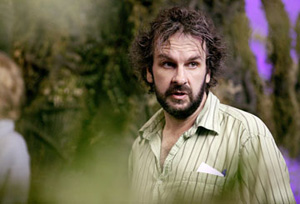 If Kong really was his dream, personal project, perhaps there is nothing else in him but monster movies with big hearts.
If Kong really was his dream, personal project, perhaps there is nothing else in him but monster movies with big hearts.
Now I think Jackson is super-awesome, I’m not belittling his creative skills, but I believe his instincts, as with Raimi’s, run to commercial, crowd pleasing and spectacle-based popcorn entertainment. Low budget film-making was always a necessity rather than a choice. Independence as a financial situation, not an artistic philosophy. So perhaps the real reason they are at the top of the heap today is that deep down, they were always aiming at the broadest mainstream audience.
The question may be not whether the quirky, indepedant film-makers of Evil Dead or Dead Alive still exist, but whether they existed at all.
And so the next 5-10 years will be very interesting for geek favourite directors like Jackson and Raimi. Will they create personal masterpieces, dark subversive oddities, or more excellently made summer tentpoles? Should we need our heroes to make challenging films for us to think them great? Is there anything wrong with being the very best at making Hollywood films?
Beats me, but I’m gunning for some ultra-gory zombie-nazi action. That’s my dream Jackson project. What’s yours?
Shane Yaroch: I want him to make a film about the space race where there’s a transition that fades from Naomi Watts’ nipples into two rockets blasting off.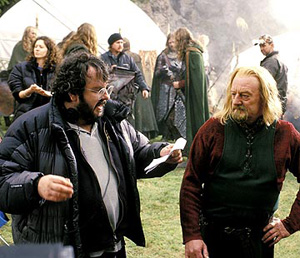 Charlie Brigden: Hearing him talking about the other flicks he wants to do (i.e. more low-budget zombie flicks) does remind me about Lucas, but I always get the impression he has more of an impetus to do it. I’m looking forward to seeing how Lovely Bones turns out, and while Kong was his dream project, it was something he was pursuing long before LOTR so I was glad to see it turn out the way it did, as he deserved it.
Charlie Brigden: Hearing him talking about the other flicks he wants to do (i.e. more low-budget zombie flicks) does remind me about Lucas, but I always get the impression he has more of an impetus to do it. I’m looking forward to seeing how Lovely Bones turns out, and while Kong was his dream project, it was something he was pursuing long before LOTR so I was glad to see it turn out the way it did, as he deserved it.
I’m not sure he’s the same as Raimi, really. I don’t think Raimi was ever that interested in horror, more exploiting the genre to make a name for himself and some money. I mean, Raimi’s obviously an influence on Jackson, but I think PJ’s more mainstream movies are better by far than Raimi’s. Spider-Man 2 is his best, but even that is hampered by a love story that just doesn’t work very well, although to be fair a lot of that rests on the casting of Kirsten Dunst.
I do see PJ as a champion of genre though. This is the thing, people only seem to take some directors seriously until they come out of making genre films, and make a more dramatic piece, i.e. Raimi and A Simple Plan, which I think is indicative of the bias against genre that still exists amongst a lot of people. Personally, I’d rather see more LOTR or Kong-esque flicks rather than some of the stuff Soderbergh and Van Sant do.
Carlton Stevens: No matter how you cut it, I can’t see Lovely Bones being some sort of special effects extravaganza with big monsters. Big heart, sappy emotion to it? Probably. But gigantic monsters and huge epic battles don’t fit well into the little I know of the story. I guess you can have a big scene where God battles Oliphaunts, Nazgul, and shit.
And just because they may have ultimately made big, gigantic and loud films about elves and superheroes, doesn’t mean that they are some sort of inherent symbol of geekdom. I always saw Jackson more in the DIY vein because he proved that you can climb the ladder of an otherwise elitist corporate system and make what you want. I don’t really care if it’s “personal” or not…it’s more in the fact that he got to where he is that impresses me, what he does now may not be some sort of independent dream, but its still inspirational to say the least.
And this “geek favorite” director’s thing is just silly. If they fail they fail, if not good for them, I hope they make some strides in filmmaking for the filmmakers to come, not so I can be less embarrassed about wearing a Transformers hat in public. I’m as much of a geek as the next guy, probably even more of one, and I certainly don’t see Raimi or Jackson as some sort of representation of my ideals and appreciations in life. Also, the geek subgroup isn’t quite important enough to even really be that recognized or regarded; we’re a hairy mole on the pop culture buttocks. We certainly don’t need some sort of representation in films. There are far larger and more interesting groups who could use a cinematic push rather than that guy at the comic shop who genuinely thinks Gambit and Marrow are awesome.
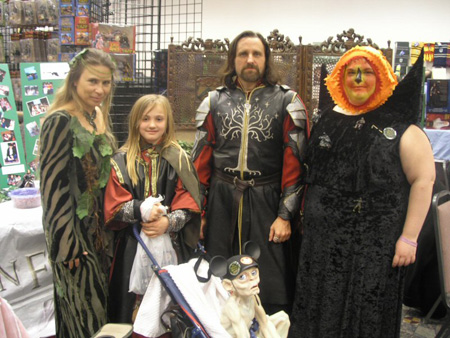
George: PJ being seen as a "geek director" and some sort of representation of that sub-culture’s outlook on films and everything else is a silly thing. I just think that’s a pretty limiting label to place on the guy. Granted, it’s a fan label, which really doesn’t mean shit. But it is annoying.
Bill Nolen: I don’t think that PJ necessarily has to walk away from genre flicks to be taken seriously, but I would like to think that he would want to expand his dramatic skills in a non-genre picture at some point. We all know that his creativity wouldn’t need to be stifled by a more traditional production. I want him to take a shot with someone else’s script, a good script, the best script he can get his hands on. Then, when he is separated from the writing somewhat, we will see what he’s capable of. I’m not complaining about the writing that he, Fran and Phillipa are doing, but I think the heavy themes from LOTR and Kong didn’t allow them to break out much. He shouldn’t shy away from comedies either. One could say that we already have a Spielberg and a Shyamalan to make sickly-sweet dramas. I want PJ to remain unique, but to expand as much as he can in his future projects.
Andrew Clarke: Who knows why he rose to the top? Because LOTR is the ultimate franchise but was considered unfilmable which made it available for an outsider with the guts and passion to tackle it? Because his background of DIY film-making meant he could stretch every dollar and make what started as relatively low to medium budget films into epic size and scope? Becasue he is the most in tune with the curent interests of geeks? Because underneath the chummy exterior he is a very canny and cold blooded deal maker?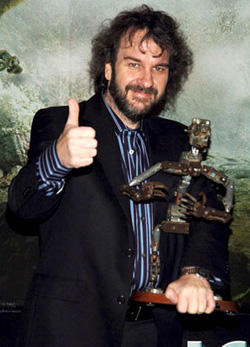 If anything, it is his skills as a business man that brought him to the top. As film-watchers, we will naturally point to how great his films are for us, but the nature and quality of his work may have little to do with it, much as that may offend us. The bizarroverse of the film-makers is usually fairly uncomprehensible to us on this side of the screen, no matter how much we pretend to sound knowledgable.
If anything, it is his skills as a business man that brought him to the top. As film-watchers, we will naturally point to how great his films are for us, but the nature and quality of his work may have little to do with it, much as that may offend us. The bizarroverse of the film-makers is usually fairly uncomprehensible to us on this side of the screen, no matter how much we pretend to sound knowledgable.
And never forget luck, being in the right place at the right time and all of those nebulous, ineffable matters of fate, market and chance no-one inside the business, let alone us, can explain or predict.
The point is this: no matter how much us geeks can champion a director, there was no inevitability to his rise. Nor is there any inevitability to his staying at the top.
But, for the moment, he is here, at the top, with the power. The only interesting question for me is what he is going to do with it.
George: Well put. And I think that’s as good a note as any to end this long but fun article. Thanks for taking the time to participate, guys!

Got an idea for a Chewer Column article or op-ed piece? Let me know! Comments, praise, mudslinging, and all that good stuff are welcomed too. Just email me at george@chud.com with CHEWER COLUMN in the subject line.